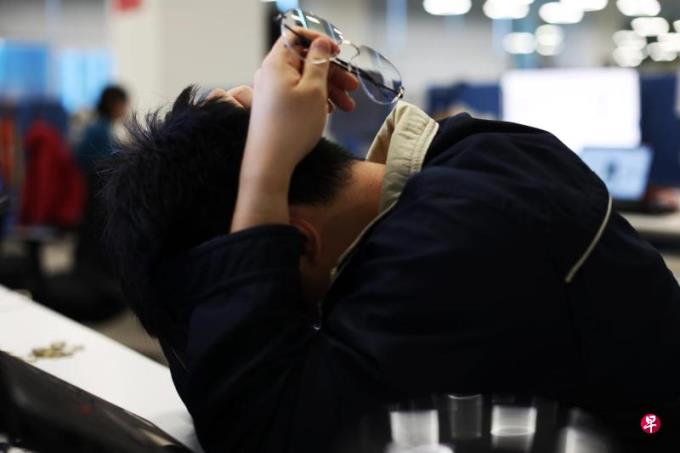
Every photo of people on the Internet is always in comparison. Personal happiness is in this infinite contest. The unique personal experience is no longer important.Putting to social media decide.The quantity and quality of likes, comments and sharing also directly affect people's emotions, and prompt people to become stronger and stronger.
Reading a few days ago, I found that the two mainstream newspapers in Singapore also published the same information on the front version of the headline, that is, the results of the national youth psychological health research survey released by the local psychological health college on September 19.According to the survey, one -third of the local teenagers (15 to 35 years old) have severe depression and anxiety.The survey also pointed out that every four teenagers in the local area have more than three hours of using social media every day; while over -use social media, figure anxiety, and network bullying are the main factor that promotes psychological health problems in teenagers.
Why are these young people in a relatively secure environment, but so psychologically disturbed?The results of such a survey reminded me of the discussion of the "digital depression era" proposed by German psychologist Sarah Diefenbach in the past few years.She believes that Internet technology has shaped our era and also shaped the spiritual conditions of human beings in this era.In addition, I also think of the overpowing generation of the new book published by Chen Pinhao, a clinical psychologist in Taiwan in April this year."Overseas" is an abbreviation for excessive exposure. The original intention refers to the phenomenon of highlighting the screen brightness due to factors such as the aperture set or slowing the shutter set by the camera.Chen Pinhao borrowed this concept to describe people who were closely dependent on the Internet and were fed by a large number of audiovisual communities in the growth."Over -exposure" refers to the younger generation excessively exposed to the Internet.
Although most of Chen Pinhao tutoring is adolescent students, the core psychological problem of the "overexposure generation" of the "overexposure generation" he observed: "The network is native, the boundary is out of order, and the surplus is lost", which is worthy of each of us.For this generation, the Internet is the existence of air; what happened in physical space will further ferment on the Internet to control people's attention and cause "boundary lines"; and "extra Yuyu lost"And the lack of psychological spectacle.The book pointed out: "The high -speed pace compressed the waiting for waiting, making people pay more attention to whether they are paying more attention to themselves, it is easy to be uneasy and anxious in the relationship, and at the same time, it gradually loses the environment of cultivation of deep focus." For example, if young people encounter encountersIn the era of interpersonal conflicts, in the era of no social media, they have enough time and space to rest and calm down, as well as thinking and digestion.The Internet and social media that now exist like air have compressed people's psychological surplus.
Chen Pinhao said that the overexposure generation has the following characteristics: "Behind the seemingly fragile, it is actually vulnerable to emotional trouble, generally inconsistent attention, fragmentation of thoughts, abstract thinking, thinking content and depth of generalness, low depth, and depth.There is a state of low motivation for evaluating an evaluation that is beyond the same age and lacks a sense of goals.
In fact, we all enter an era of Internet+smartphones. This is also an era when digital life becomes widespread.The rapid update iteration speed has made people too late to examine all the advantages and disadvantages it brings.Our happiness unknowingly accepted the definition of social media, and quietly shaped the overexposure generation.This makes the advent of the digital depression era.
It doesn't seem to exist on the sunset
Food may make people have endless aftertastes, but if you do n’t take pictures or put on social media on social media, you may not have eaten it; the sunset may be very magnificent, but if you do n’t put it on the Internet, it seems that you have never existed;If you do n’t put on the Internet, if you do n’t gather together ... Unconsciously, people ’s thinking mode and behavior will be affected. We feel the ability of happiness and have already handed them out.This makes people pay more and more attention, not the current experience.Once the important moment in life is not recorded, the value of this incident is discounted.
At the same time, every photo of people put on the Internet is constantly comparison, and it is compared with similar photos and videos sent by countless corners around the world.Personal happiness is becoming more and more tasteless in this infinite contest. At present, the unique personal experience is no longer important. The degree of happiness has made it to social media to decide.The quantity and quality of likes, comments and sharing also directly affect people's emotions, and prompt people to become stronger and stronger.In fact, most of our desire comes from comparison and imitation, not the real needs in our hearts; sometimes we are led by the so -called "should", and the desire from "should" will bring ourselves to ourselvesWhere to go.This has a very profound impact for 15 -year -old young people who are looking for identity and self -worth.
Daniel Ullrich, Daniel Ullrich, reminds people in the book of digital depression in the co -digital depression era. In addition to paying attention to how the technology in the digital age is controlled by our happiness, we must also be alert to the technology beltThe privilege.In the book, they gave an example: the photographer Caroline strikes on a wild animal observation journey in South Africa.But what is more angry about her is more angry than the camera strike.They all said, "Let Anna sit over, you are useless there." Without the equipment, she lost her rights and could only sit silently in the back row.
Seeing this example, I feel shuddering. Similar scenes have happened countless times in life. We lose some right, but we are accustomed to it.Go to Binhai Bay to watch the fireworks performance and watch the dragon formed by the unattended unit. People who hold their mobile phones and the camera will always have the privilege that stands at the commanding height and the front.Let them get out of the position.If you are standing in front of the best appreciation at this time, you do n’t raise your phone or exit, it is “shameless”, at least it ’s“ pay attention ”?This is a hidden rule that people are unprepared.This is a kind of shaping of people's behavior and psychology in the Internet era and technology.If we do not notice it, we do n’t reflect, and in the end, almost everyone will become the fish of the digital depression era.
The author is a former media person and creator of children's books




